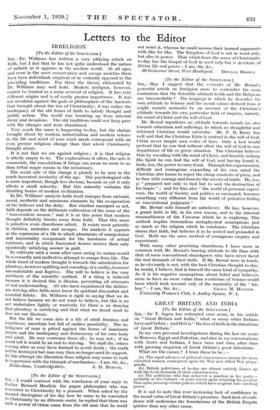[To the Editor of the SPECTATOR.] SIR,—May I suggest that
the contents of Mr. Bemal's powerful article on Irreligion seem to contradict his main contention that the Scientific attitude to life and the Religious are irreconcilable ? The language in which he describes his own attitude to Science and the moral values derived from it might mutatis mutandis be an account of the Christian's attitude towards his own particular field of enquiry, namely, the mind of Christ and the will of God.
Mr. Bernal repudiates an attitude towards morals (as also towards education and suffering), to which no thoughtful and informed Christian would subscribe. Mr. F. R. Barry has well said that the Christian Ethic is centred in the will of God. Christ never taught men codes of laws. Only a fool would pretend that he can find without effort the will of God in any department of life or given situation. The Christian believes that by wrestling with the mind of Christ, and humbly seeking His Spirit he can find the will of God, and having found it, finds, too, the power to carry it out. Through this experimental, difficult and courageous expanding of his own mind the Christian also learns to reject the cheap comforts of piety, and to face with courage and honesty the service of truth. Ile, too, is " prepared not only to find but to seek the destruction of his hopes " ; and for him also " the world of personal experi- ence, the world of Society and politics so envisaged, becomes something very different from the world of primitive feeling or conventional judgment."
Mr. Bernal calls himself an unbeliever. He has, however, a grand faith in life, in his own reason, and in the inherent reasonableness of the Universe which he is exploring. This outlook implies tremendous metaphysical assumptions just as much as the religion which he condemns. The Christian shares that faith, but believes it to be rooted and grounded in God. Both use the same method of courageous enquiry and experiment.
With many other practising churchmen, I have more in conunon with Mr. Bernal's bracing attitude to life than with that of some conventional churchgoers who have never faced the real demands of their faith. If Mr. Bernal were in touch, as he obviously is not, with the best Christian thought to-day, he would, I believe, find in himself the same kind of sympathy. As it is his negative assumptions about belief and believers seem to have no more value than a criticism of Science would have which took account only of the mentality of the " lab.










































 Previous page
Previous page